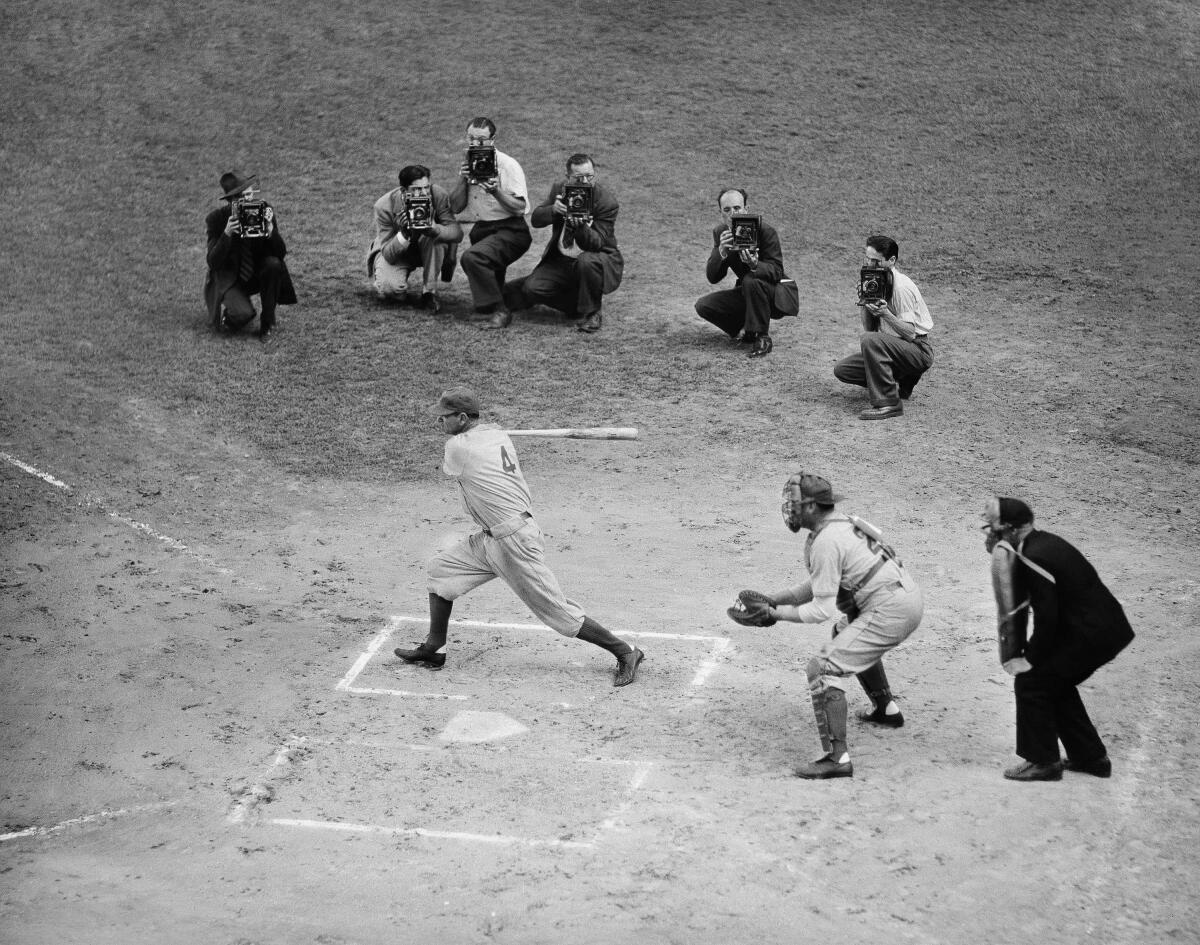Dodgers Dugout: The 25 greatest Dodgers of all time, No. 12: Zack Wheat

- Share via
Hi, and welcome to another edition of Dodgers Dugout. My name is Houston Mitchell as we continue the top-25 countdown.
Are you a true-blue fan?
Get our Dodgers Dugout newsletter for insights, news and much more.
You may occasionally receive promotional content from the Los Angeles Times.
Readers voted in droves, submitting 15,212 ballots by email, Twitter and Facebook. Voters were asked for their top 10 Dodgers in order from 1 to 10, with first place receiving 12 points, second place nine points, third place eight, all the way down to one point for 10th place.
The last time we did this was in 2018, and there were some changes in the rankings.
So, without further ado:
Enjoying this newsletter?
Your support helps us deliver the news that matters most. Become a Los Angeles Times subscriber.
The 25 greatest Dodgers, No. 12: ZACK WHEAT (17,083 points)
2018 rank: 20th
I put my thumb on the scale a bit with this one, as I wrote extensively about Wheat a couple of months ago while voting was in progress. Here’s an abridged version.
Wheat played for the Dodgers from 1909 to 1926 and was inducted into the Hall of Fame in 1959. He is still the all-time Dodgers leader in games (2,322), hits (2,804), doubles (464), triples (171) and total bases (4,003).
His best season might have been 1918, when he led the league with a .335 batting average. Or it might have been 1916, when he hit 32 doubles and 13 triples and led the league in slugging. Or it might have been 1922, when he hit .335 with 29 doubles, 12 triples, 16 homers and 112 RBIs. Or it might have been any number of other seasons. He finished with a .317 career batting average.
And don’t think he was only a hitting machine. He was a great defensive outfielder.
Baseball Magazine in 1918: “What Napoloen Lajoie was to infielders, Zack Wheat is to outfielders, the finest mechanical craftsman of them all. He is the easiest, most graceful of outfielders with no close rivals.”
Wheat got married during the 1912 season and his new wife, Daisy, became his agent. In the same Baseball Magazine story, she said, “I made him hold out each year for seven years and each time he got a raise.”
Other things of note about Wheat:
—He has an OPS+ of 130. Among Dodgers with 5,000 plate appearances (Wheat had almost 10,000), that is third behind Duke Snider and Jackie Robinson.
—He is fourth in career WAR among batters, behind Snider, Robinson and Pee Wee Reese.
—To make money during the offseason, Wheat raised mules and sold them to the Army, which used them as pack animals during World War I. It was because of the money he made doing this that he was able to hold out for a better contract each offseason. The most money he earned in one season as a player was $16,000.
—No longer needing Wheat and thinking he was getting too old, the Dodgers released him before the 1927 season so he could negotiate with any club he wanted to, instead of trading him to a team he didn’t wish to play for. Wheat signed with the Philadelphia A’s and hit .324 in 88 games.
—Wheat was listed as 5 feet 10 and 170 pounds, but many thought he was smaller than that. He wore a size-5 shoe and suffered from ankle problems throughout his career. A bruised heel brought an end to his career.
—Wheat became a policeman in Kansas City after he retired. While on a call in 1936, Wheat crashed his car and suffered a fractured skull, broken wrist and 15 broken ribs. He spent five months in the hospital and retired. He moved with his family to a lakeside house in Sunrise Beach, Mo., and opened a 46-acre hunting and fishing resort.
—Wheat was voted into the Hall of Fame by the veterans committee in 1957. Unfortunately, he wasn’t eligible to be voted in because he hadn’t been retired long enough. So it elected him again in 1959.
—When told he finally was elected at 70, Wheat said, “That makes me feel mighty proud. I feel a little younger too.”
—Wheat once was asked his secret for playing so well for so long. He said: “I smoke as much as I want and chew tobacco a good deal of the time. I don’t pay any attention to the rules for keeping in physical condition. I think they are a lot of bunk. The less you worry about the effect of tea and coffee on the lining of your stomach, the longer you will live and the happier you will be.”
—Wheat died of a heart attack in Missouri on March 11, 1972. He was 83 years old.
Previously
Some interesting stats
A few things hopefully of interest as we wait for the postseason:
First basemen with 20 steals and 20 homers in a season
Freddie Freeman, 2023 Dodgers, 26 homers, 20 steals
Ian Desmond, 2018 Colorado, 22-20
Wil Myers, 2017 San Diego, 30-20
Wil Myers, 2016 San Diego, 28-28
Paul Goldschmidt, 2016 Arizona, 24-32
Paul Goldschmidt, 2015 Arizona, 33-21
Derrek Lee, 2003 Florida, 31-21
Ryan Klesko, 2001 San Diego, 30-23
Ryan Klesko, 2000 San Diego, 26-23
Jeff Bagwell, 1999 Houston, 42-30
Kevin Young, 1999 Pittsburgh, 26-22
Jeff Bagwell, 1997 Houston, 43-31
Jeff Bagwell, 1996 Houston, 31-21
Rafael Palmeiro, 1993 Texas, 37-22
Orlando Cepeda, 1959 San Francisco, 27-23
Earl Torgeson, 1951 Boston Braves, 24-20
Most home runs by a leadoff hitter:
Mookie Betts, 2023, 39
Alfonso Soriano, 2006, 39
George Springer, 2019, 39
Kyle Schwarber, 2022, 38
Alfonso Soriano, 2002, 38
Ronald Acuña Jr., 2023, 37
Charlie Blackmon, 2017, 37
Francisco Lindor, 2018, 37
Brady Anderson, 1996, 35
Mookie Betts, 2022, 35
Bobby Bonds, 1973, 35
Alfonso Soriano, 2003, 35
Most RBIs by a leadoff hitter:
Mookie Betts, 2023, 103
Charlie Blackmon, 2017, 103
Darin Erstad, 2000, 100
Alfonso Soriano, 2002, 99
Ronald Acuña Jr., 2023, 98
Nomar Garciaparra, 1997, 98
Jacoby Ellsbury, 2011, 97
George Springer, 2019, 96
Brian Dozier, 2017, 93
DJ LeMahieu, 2019, 92
Finally, a stat that makes the Dodgers winning the West all the more remarkable:
Most innings pitched by a Dodger this season:
Clayton Kershaw, 121.1
Julio Urías, 117.1
Bobby Miller, 107.1
Tony Gonsolin, 103
Michael Grove, 64
Brusdar Graterol, 63.1
Evan Phillips, 56.2
Caleb Ferguson, 56.1
Noah Syndergaard, 55.1
Lance Lynn, 52
That’s amazing. Two guys who are no longer on the team, one guy who was acquired at the trade deadline, a rookie who wasn’t even supposed to be on the team this season, two guys who are on the IL.
Let’s look at the innings leaders last season:
Tyler Anderson, 178.2
Julio Urías, 175
Tony Gonsolin, 130.1
Clayton Kershaw, 126.1
Andrew Heaney, 72.2
Walker Buehler, 65
Evan Phillips, 63
Phil Bickford, 61
Craig Kimbrel, 60
Mitch White, 56
And the innings leaders for the 1988 World Series champions:
Orel Hershiser, 267
Tim Leary, 228.2
Tim Belcher, 179.2
Fernando Valenzuela, 142.1
Alejandro Pena, 94.1
Don Sutton, 87.1
Brian Holton, 84.2
Tim Crews, 71.2
Jay Howell, 65
Shawn Hillegas, 56.2
The Dodgers used 19 pitchers in 1988. They have used 39 this season. Amazing how much the game has changed.
How they got here
Our Dodgers beat writer, Jack Harris, has a terrific story on the season so far, looking at the highs and lows and how the team recovered from that dreadful stretch when it fell into third place. Harris is with the team all season at home and on the road (though the slacker insists on time off occasionally. What, he can’t work seven days a week for six months?) It has some great insight and you can read it here. Yes, it’s behind a paywall, but it’s only $1 for six months. This newsletter, of course, remains free.
Some key quotes:
Dave Roberts: “Every year is different, but for me, this is the most fun I’ve had managing. To see those guys celebrate one another, pull for one another, sacrifice for each other. It makes my job that much more joyful.”
Max Muncy, on people wondering how they would do after losing Justin Turner, Trea Turner and Cody Bellinger: “I think a lot of us were wondering the same thing. Wondering what it was gonna be like this year.”
Roberts: “Justin was the guy that ended up being the mouthpiece for a lot of the players, taking accountability, answering the tough questions, being the go-to guy. To lose that was hard. It took us a while.”
And you will learn how important Jason Heyward and Miguel Rojas have been to this team.
And finally
Dodgers clinch the 2016 NL West title on Charlie Culberson’s walk-off homer. Watch and listen here.
Until next time...
Have a comment or something you’d like to see in a future Dodgers newsletter? Email me at [email protected], and follow me on Twitter at @latimeshouston. To get this newsletter in your inbox, click here.
Are you a true-blue fan?
Get our Dodgers Dugout newsletter for insights, news and much more.
You may occasionally receive promotional content from the Los Angeles Times.




